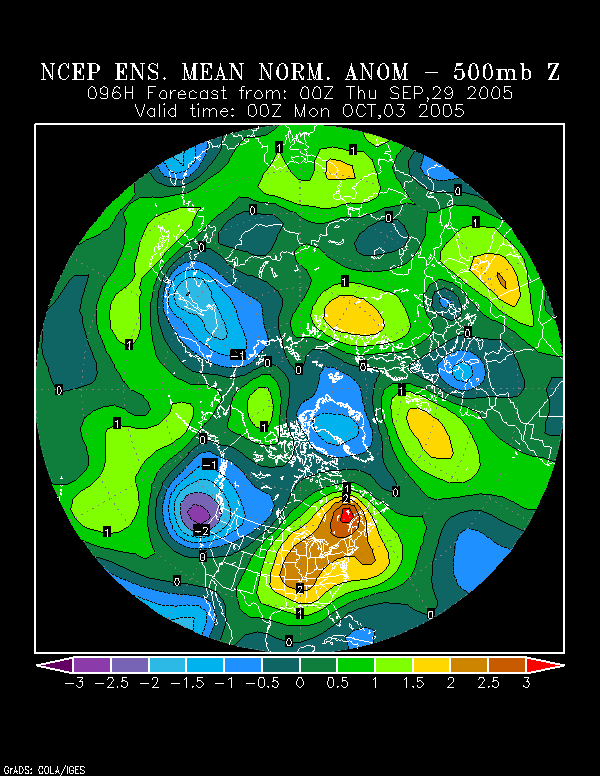The model guidance is now very bullish on a spell of above to much above normal temperatures in the eastern U.S. beginning by next weekend (weekend of 10/2-3). The potential exists for at least a day or two of extreme heat relative to the season.
Select 850 mb Temperatures per the 9/26 0z run of the ECMWF:
Boston:
10/2 0z: 12.9C
10/3 0z: 16.3C
New York City:
10/2 0z: 14.0C
10/3 0z: 16.7C
Philadelphia:
10/2 0z: 14.6C
10/3 0z: 16.6C
Richmond:
10/2 0z: 12.8C
10/3 0z: 16.2C
Washington, DC:
10/2 0z: 13.6C
10/3 0z: 15.8C
For those two days, the ECMWF suggests that cloud cover could be low. So, the mercury should be off to the races, particularly on Sunday.
The NCEP Ensemble Anomaly is very impressive for 10/3 0z. In fact, with the core of the anomalous heat focused on New England, if a west wind were to sweep into Boston, the temperature could well challenge or beat the all-time monthly record of 90° for that city established on several dates. It's still a little soon to have high confidence in that idea, but it might be something to watch for. And depending on how the season-ending series goes between the Red Sox and Yankees, the heat could prove especially hellish, especially if the Cleveland Indians hang on to win the American League wild card spot.
NCEP 500 mb Anomalies:

ECMWF vs. GFS 8-10-Day 500 mb Means:

The NCEP Ensemble anomalies seem to more closely resemble the 8-10 Day ECMWF 500 mb mean.
Records for Select Cities:
Boston:
10/2 88, 1954
10/3 85, 1922
10/4 85, 1983
October record: 90, 10/1/1881, 10/7/1963, and 10/12/1954
New York City:
10/2 90, 1927
10/3 87, 1919
10/4 88, 1941
October record: 94, 10/5/1941
Philadelphia:
10/2 87, 2002
10/3 90, 1919
10/4 88, 1941
October record: 96, 10/5/1941
Richmond:
10/2 91, 1986
10/3 94, 1919
10/4 94, 1986
October record: 99, 10/6/1941
Washington, DC:
10/2 89, 1986
10/3 92, 1879
10/4 94, 1954
October record: 96, 10/5/1941
At this point in time, I have sufficient confidence that at least some record highs will fall in the 10/2-4 period. Moreover, I believe Richmond and Washington, DC will break 90° on at least one occasion and that potential extends into New England if everything comes together.
The most extreme outbreak of October heat occurred in 1941. Just for fun and not forecasting purposes--at least hopefully this won't prove to be my winter idea--Winter 1941-42 proved very disappointing in the East in terms of seasonal snowfall. Essentially, in terms of snowfall, winter was confined to a single month--March 1942:
Boston: 24.0"
New York City: 11.3"
Philadelphia: 9.8"
Washington, DC: 13.6"
Needless to say, there were some highlights:
∙ March 2-3, 1942: 19.3" snowfall in Cedartown, GA
∙ March 29-30, 1942: Washington, DC was buried under 12" of snow and Baltimore picked up 22".
In conclusion, "true summer" returned to the East in a big way this year. Now, even as the calendar has moved into Autumn when the leaves, acorns and temperatures should be falling, Summer appears reluctant to depart.










